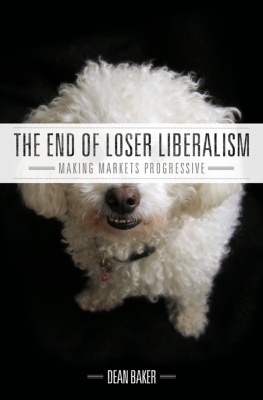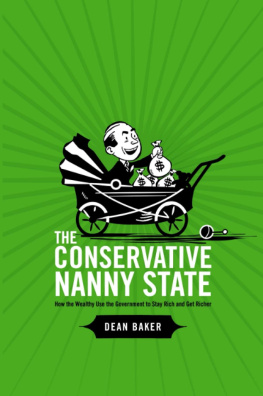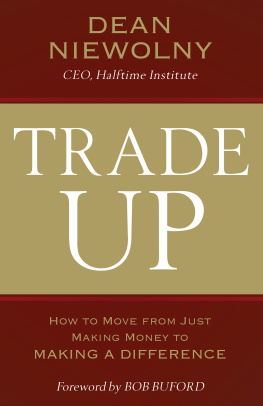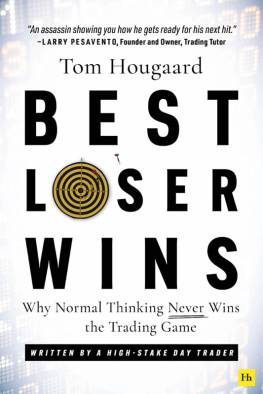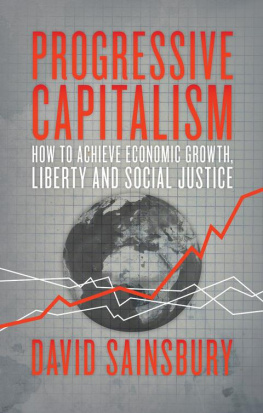Dean Baker - The End of Loser Liberalism: Making Markets Progressive
Here you can read online Dean Baker - The End of Loser Liberalism: Making Markets Progressive full text of the book (entire story) in english for free. Download pdf and epub, get meaning, cover and reviews about this ebook. year: 2011, publisher: Center for Economic and Policy Research, genre: Politics. Description of the work, (preface) as well as reviews are available. Best literature library LitArk.com created for fans of good reading and offers a wide selection of genres:
Romance novel
Science fiction
Adventure
Detective
Science
History
Home and family
Prose
Art
Politics
Computer
Non-fiction
Religion
Business
Children
Humor
Choose a favorite category and find really read worthwhile books. Enjoy immersion in the world of imagination, feel the emotions of the characters or learn something new for yourself, make an fascinating discovery.
- Book:The End of Loser Liberalism: Making Markets Progressive
- Author:
- Publisher:Center for Economic and Policy Research
- Genre:
- Year:2011
- Rating:5 / 5
- Favourites:Add to favourites
- Your mark:
- 100
- 1
- 2
- 3
- 4
- 5
The End of Loser Liberalism: Making Markets Progressive: summary, description and annotation
We offer to read an annotation, description, summary or preface (depends on what the author of the book "The End of Loser Liberalism: Making Markets Progressive" wrote himself). If you haven't found the necessary information about the book — write in the comments, we will try to find it.
Dean Baker: author's other books
Who wrote The End of Loser Liberalism: Making Markets Progressive? Find out the surname, the name of the author of the book and a list of all author's works by series.
The End of Loser Liberalism: Making Markets Progressive — read online for free the complete book (whole text) full work
Below is the text of the book, divided by pages. System saving the place of the last page read, allows you to conveniently read the book "The End of Loser Liberalism: Making Markets Progressive" online for free, without having to search again every time where you left off. Put a bookmark, and you can go to the page where you finished reading at any time.
Font size:
Interval:
Bookmark:
Published by the Center for Economic and Policy Research
1611 Connecticut Ave. NW, Suite 400
Washington, DC 20009
www.cepr.net
Cover photo by Helene Jorgensen
Cover design by Justin Lancaster
Creative Commons (cc) 2011 by Dean Baker
Notice of rights: This book has been published under a Creative Commons license. This work may be copied, redistributed, or displayed by anyone, provided that proper attribution is given.
ISBN: 978-0-615-53349-0
I have benefitted enormously from discussing the ideas in this book with my colleagues at the Center for Economic and Policy Research, Eileen Appelbaum, Heather Boushey, Helene Jorgensen, David Rosnick, John Schmitt, and Mark Weisbrot. I also received helpful comments on the manuscript from Alan Barber, Kris Warner, and Nicole Woo. Jane Farrell helped with the graphs. Pat Watson did his usual outstanding job editing the book.
I thank Helene, Walnut, Olive, and Kiwi for tolerating my neglect while writing the book. And Biscuit deserves special note for allowing himself to be the poster boy of Loser Liberalism.
Money does not fall up. Yet the United States has experienced a massive upward redistribution of income over the last three decades, leaving the bulk of the workforce with little to show from the economic growth since 1980. This upward redistribution was not the result of the natural workings of the market. Rather, it was the result of deliberate policy, most of which had the support of the leadership of both the Republican and Democratic parties.
Unfortunately, the public and even experienced progressive political figures are not well informed about the key policies responsible for this upward redistribution, even though they are not exactly secrets. The policies are so well established as conventional economic policy that we tend to think of them as incontrovertibly virtuous things, but each has a dark side. An anti-inflation policy by the Federal Reserve Board, which relies on high interest rates, slows growth and throws people out of work. Major trade deals hurt manufacturing workers by putting them in direct competition with low-paid workers in the developing world. A high dollar makes U.S. goods uncompetitive in world markets.
Almost any economist would acknowledge these facts, but few economists have explored their implications and explained them to the general public. As a result, most of us have little understanding of the economic policies that have the largest impact on our jobs, our homes, and our lives. Instead, public debate and the most hotly contested legislation in Congress tend to be about issues that will have relatively little impact.
This lack of focus on crucial economic issues is a serious problem from the standpoint of advancing a progressive agenda. Mainstream economic conservatives already have an enormous advantage in national politics because they control most of the money that finances political campaigns. To add to that, they also use their money to buy directly into the national debate by funding organizations and projects intent on undermining important programs they dont like as investment banker Peter Peterson has done with his decades-long crusade against Social Security and Medicare. But all the money in the world will hardly matter if progressives do not understand how basic, conventional economic policy militates against the interests of working people and the disadvantaged. If they dont even know what winning would look like, then the prospects for a progressive economic agenda are bleak.
For the most part, progressives accept the rights framing of economic debates. They accept the notions that the right is devoted to the unfettered workings of the market and, by contrast, that liberals and progressives are the ones who want the government to intervene to protect the interests of the poor and disadvantaged.
But this view is utterly wrong as a description of the economy and competing policy approaches. And it makes for horrible politics. It creates a scenario in which progressives are portrayed as wanting to tax the winners in society in order to reward the losers. The right gets to be portrayed as the champions of hard work and innovation, while progressives are seen as the champions of the slothful and incompetent. It should not be surprising who has been winning this game.
In reality, the vast majority of the right does not give a damn about free markets; it just wants to redistribute income upward. Progressives have been useful to the right in helping it to conceal this agenda. Progressives help to ratify the actions of conservatives by accusing them of allegiance to a free-market ideology instead of attacking them for pushing the agenda of the rich.
For the last three decades the right has been busily restructuring the economy in ways that ensure that income flows upward. The rules governing markets, written by the rich and powerful, ensure that this gravity-defying outcome prevails. The right then presents the imposition of rules that it likes as the natural result of unfettered market forces.
Rarely does this upward flow of income require a government check to the wealthy. But when the checks are necessary, they come. The Treasury and the Federal Reserve Board gave trillions of dollars in loans, at below-market interest rates, to the largest Wall Street banks at the peak of the financial crisis in 2008. These loans kept Goldman Sachs, Citigroup, and most of the other major Wall Street banks from collapsing, and the subsidies implied by the loans and guarantees to the worlds largest banks were in the tens if not hundreds of billions of dollars. Yet somehow this massive intervention on behalf of these banks executives, shareholders, and bondholders some of the richest people in the country is not viewed as interference with the market.
While the bank bailouts were big news, there is no shortage of less-visible instances in which conservatives have long been eager for the government step in to support the interests of the wealthy. Well quickly discuss seven examples here: continued support for too-big-to-fail banks, patent and copyright protection, restrictions on organized labor, corporate liability limitations, Federal Reserve monetary controls, trade and dollar policy, and housing policy.
To start with an easy one, how many free market fundamentalists have rallied behind efforts to break up too-big-to-fail banks? This one should be a no-brainer for any genuine believer in free markets. A too-big-to-fail bank is a bank that everyone expects will be bailed out by the government if it gets in trouble, as happened in 2008. Because investors can assume that the government will back up the bank, they are willing to lend it money at a lower interest rate than if they thought the bank was standing on its own. How could any believer in the virtue of free markets support the existence of large financial institutions that borrow at a lower cost than their competitors because of an implicit guarantee from the government?
The fact that most of those claiming to be free marketers have overwhelmingly been on the side of the too-big-to-fail banks tells the world as clearly as possible that their motivations have nothing to do with a commitment to market fundamentalism and everything to do with a commitment to serving the interests of the rich and powerful. This is disguised as a commitment to the market for the obvious reason that doing things out of a commitment to free market principles sounds better than explicitly claiming to pursue policies that redistribute income from the vast majority of the population to the rich.
Font size:
Interval:
Bookmark:
Similar books «The End of Loser Liberalism: Making Markets Progressive»
Look at similar books to The End of Loser Liberalism: Making Markets Progressive. We have selected literature similar in name and meaning in the hope of providing readers with more options to find new, interesting, not yet read works.
Discussion, reviews of the book The End of Loser Liberalism: Making Markets Progressive and just readers' own opinions. Leave your comments, write what you think about the work, its meaning or the main characters. Specify what exactly you liked and what you didn't like, and why you think so.

